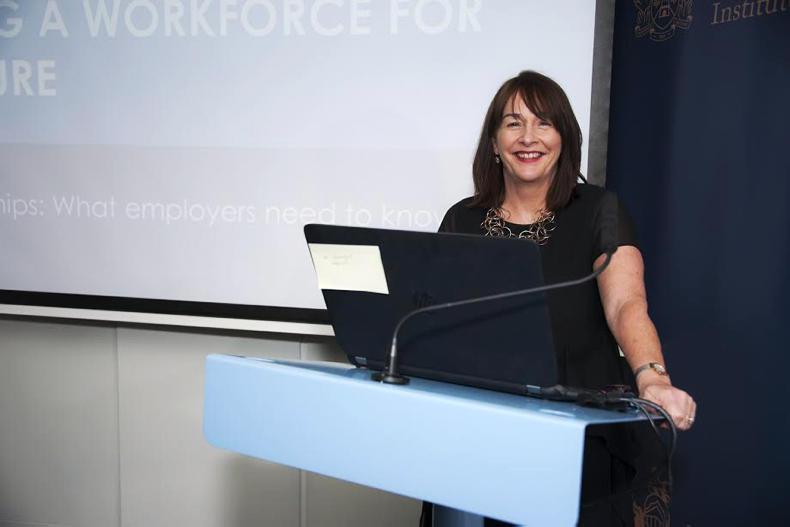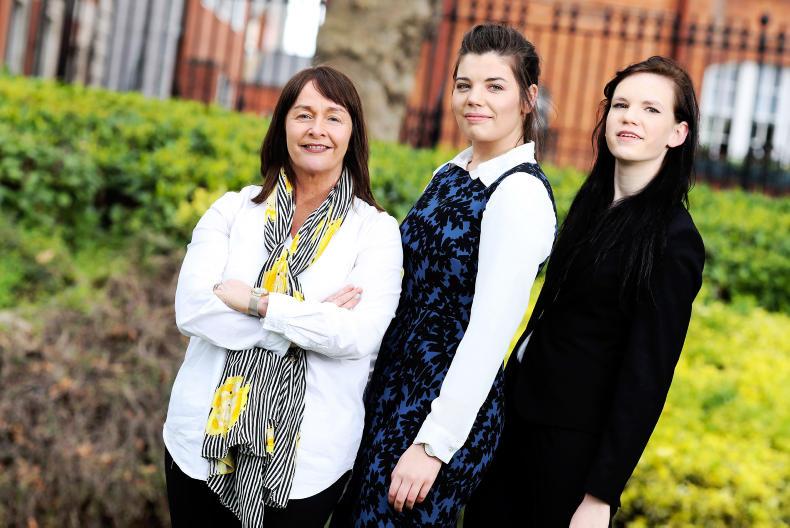The Insurance Practitioner Apprenticeship is an apprenticeship with a difference. This is a three-year “earn and learn” programme, which sees apprentices work for an insurance employer and earn a salary, while also studying for a BA (Hons) in Insurance Practice.
The programme is in its second year, and the launch for the 2017 intake took place recently.
“We were the first apprenticeship at BA honours level,” explains Sandra Harvey Graham, apprenticeship programme manager at The Insurance Institute of Ireland.
“And we were the first new apprenticeship in the country in 50 years. That’s pretty ground-breaking.”
The programme ran for the first time in 2016 with 67 apprentices, which was made up of 43% girls and 57% boys.
The Insurance Institute (which provides professional education and continuing professional development for Ireland’s insurance sector) developed this apprenticeship because it was looking for new ways to attract talent into the insurance industry.
“For a long time we had people who joined for a job, as opposed to a career in insurance,” says Sandra.
There are currently 28,000 people working in the insurance industry in Ireland, and Sandra says the Insurance Institute is “trying to build a whole new workforce in the future who’ll have the skills to take on all the challenges – and not just in the insurance industry”.
“We respond to everyone else’s risks and also look at digitalisation, creativity and innovation. We’re looking at people to bring those businesses forward, because one of the things that was specified to us was to [not] just train them for now, [but to] train them for 2020,” Sandra explains.
There is a range of jobs available in the insurance industry – in areas such as data analytics, actuarial, marketing, IT and digitalisation, while compliance is another big support function in the industry.
The programme starts in September, in line with the college academic year.
There are over 1,000 interested applicants already, for 130 jobs. Of the 1,000 applicants so far, about one third are career changers, one third are graduates and one third are school leavers.
The apprenticeship is run in partnership with IT Sligo, and apprentices complete the degree portion online, through distance learning, over three years.
Live lectures are streamed into the office for the apprentice one day per week.
“For years apprentices – such as electricians and plumbers – used to go off for 14 weeks to learn,” explains Sandra.
“We went: ‘Well, that’s not going to suit the insurance industry. We’re working in an office environment. Having people get up and go for 14 weeks just won’t work. So we looked for a provider who had some experience in distance learning and we partnered with IT Sligo.”
In terms of the of the job itself, the apprentices rotate around different departments doing different tasks, so they get to see everything – not just working in a claims department, for example.
This means they can make an informed decision about what area they would like to specialise in.
Salaries for apprentices range from €18,000 to €23,000 per annum, depending on the company they work for. Those working in the insurance industry are not allowed to advise clients until they have an accredited product adviser qualification.
Therefore, in year one, the apprentice does the three insurance examinations, leading to accredited product adviser.
In year two, there are six exams and candidates become a certified insurance practitioner. Then in year three the insurance exams are finished and candidates focus on finishing off the BA honours degree. Candidates will come out qualified as an insurance practitioner with a BA in insurance practice.
Is it difficult for candidates on this programme to balance all the different elements?
“It’s challenging,” says Sandra. “You are on your livestream lectures, so you have to keep up with the examination framework, and you are asked to do 10 hours a week in your own personal time. We recommend that. But we are supportive.
“A lot of the modules are on continuous assessment. There are only a few written exams, so we do try and keep the momentum going from week to week, so that people don’t feel they fall behind.
“There is a lot of support from IT Sligo, and from the Insurance Institute, and of course from the employer,” she says.
This is why candidates who have a “I really want to do this” frame of mind are sought.
The Insurance Institute is looking for people who are prepared to sacrifice a personal life to get a career.
“You could be 18 or you could be 45,” says Sandra. They are much more interested in a person’s motivation to want to learn, than their background.
Sandra is very passionate about the insurance industry and highlights how dynamic it is: “It never stops changing because we’re insuring risk, we’re transferring risk from either businesses or people’s personal risk – and it’s become increasingly sophisticated in the last 10 years.
“We’ve had gadget insurance; we’ve had cyber crime insurance; we’ve been looking at insurance for drones; and we’ve been looking at what’s going to happen if, for example, the driverless car market proceeds,” says Sandra.
It looks like insurance is an industry that is around for the long haul. “I think it’s been with us since the 1600s,” says Sandra.
“It will be with us in the next 100 to 200 years, because everybody needs to transfer risk and feel comfortable about what their financial situation is.” CL
If your are interested in the September 2017 programme, register online at www.earnandlearn.ie. Those registered will be the first to know when the apprenticeships become available. “And when our employers start employing, we send the interested party a link to their website saying: ‘Broker now hiring in Cavan,’ for example – if they had said they were interested in Cavan,” explains Sandra. The prospective apprentice can apply to as many companies as they want.
The minimum requirements include two honours in higher-level subjects in the Leaving Cert and a pass in four additional subjects including English/Irish and Maths. Alternatively, if applicants are over 23, interviews or other selection tools may be used.









SHARING OPTIONS